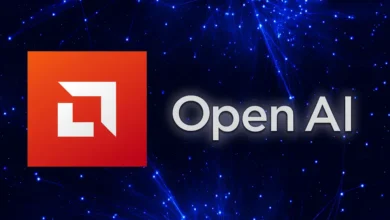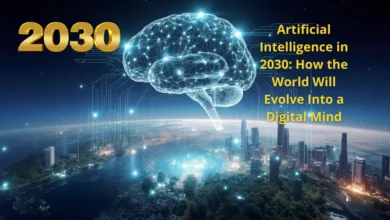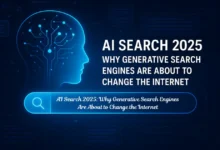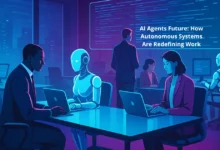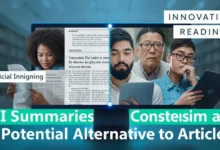AI Engineers Hold the Key to Wealth
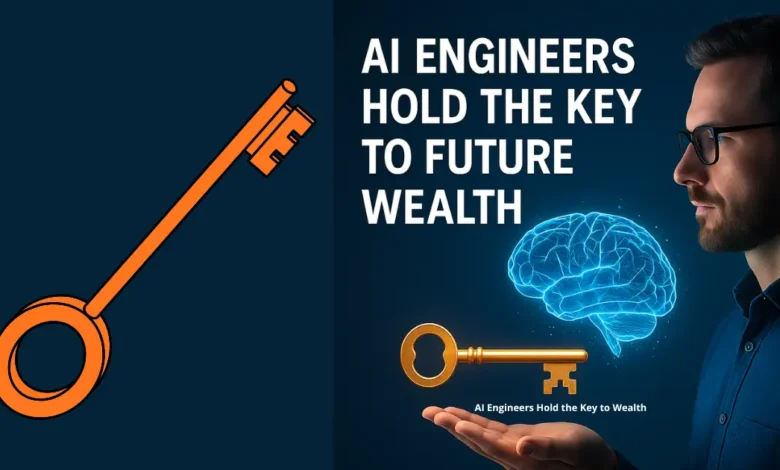
AI engineers hold the key to wealth—not as a metaphor, but as a direct economic fact emerging from the deepest transformation in technology since the internet itself
Companies are no longer competing for land, factories, or raw materials.
They’re competing for AI talent.
And those who possess the skill—coding, model building, optimization, data engineering, prompting, or applied machine intelligence—are becoming the new elite of the digital economy.
In this article, you will discover why AI engineers are becoming the highest-paid professionals of the decade, what skills open the door to this wealth, and how you—regardless of background—can start building a path toward this new economy.
table of contents
AI Engineers Hold the Key to Wealth: The Shift That Changed Everything
Over the last five years, we witnessed a global shift:
- Companies don’t ask “Do you know AI?”
They ask: “How fast can you implement it?” - Businesses don’t hire “coders” anymore.
They hire hybrid thinkers—engineers who merge logic, creativity, and business understanding. - And countries don’t race over oil or minerals.
They race over compute, algorithms, and machine-learning talent.
This shift created something unprecedented:
AI skills became a form of wealth.
Not just a job.
Not just a career.
A wealth-engine that grows as the world becomes more dependent on automation.
Why?
Because companies realized that:
1 AI engineer ≈ replaces or amplifies the output of 20–50 traditional roles.
That level of economic power is exactly why salaries exploded, demand surged, and why AI engineers now sit at the center of every major innovation wave—from autonomous systems to AI search engines to generative content to robotic automation.
Read Also :
AI Search 2025: Why Generative Search Engines Are About to Change the Internet
Why Companies Are Paying Huge Salaries for AI Talent
The global job data tells the truth clearly:
- AI engineers earn $180,000 – $500,000+ yearly in the U.S.
- Senior AI researchers in top companies cross $1M with bonuses.
- Even junior positions in emerging markets now start at $3,000 – $7,000/month.
Why this “salary inflation”?
1. AI talent shortage is real
There are far more AI projects than there are qualified engineers.
Every industry is hiring at the same time:
- Tech
- Banking
- Healthcare
- Media
- Telecom
- E-commerce
- Government
- Education
This never happened before in history.
2. AI roles create direct profit
A good AI engineer:
- reduces costs
- automates processes
- improves productivity
- increases company revenue
- speeds up product development
Companies are willing to pay anything for talent that multiplies profit.
3. AI became the backbone of global competition
Countries and corporations see AI talent as a strategic weapon.
- The U.S. wants to protect its AI lead.
- China wants to dominate AI infrastructure.
- Europe wants ethical AI power.
- Gulf countries (UAE, Saudi, Qatar, Oman) invest heavily in AI talent attraction.
The competition pushes salaries upward.
The Skills That Make an AI Engineer Truly Wealthy
Here’s the truth many don’t know:
You don’t need to be a “genius”.
You don’t need a PhD.
You need market-relevant skills, not academic theory.
Below are the skills that turn AI engineers into high-income professionals:
1. Python (the core programming language of AI)
Everything starts here.
From automation to model training to data manipulation.
2. Machine Learning Foundations
Understanding:
- supervised models
- unsupervised models
- regression & classification
- model evaluation
- overfitting & optimization
These are the must-have fundamentals.
3. Deep Learning (Neural Networks)
Key frameworks:
- TensorFlow
- PyTorch
- JAX
This is where the highest salaries exist.
4. LLM Engineering (the new gold rush)
This is the hottest skill globally:
- model fine-tuning
- embeddings
- vector databases
- RAG systems
- model evaluation
- prompt engineering at scale
Companies don’t want “ChatGPT users”—
They want engineers who know how to build systems with it.
5. Data Engineering
AI cannot function without strong data pipelines.
The market needs:
- ETL pipelines
- data cleaning
- big data systems (Spark, Hadoop)
- SQL mastery
6. AI Infrastructure Knowledge
Cloud skills:
- AWS
- Google Cloud
- Azure
Plus modern tools like:
- Docker
- Kubernetes
- distributed training
These skills separate basic engineers from top 5% earners.
How to Become an AI Engineer Even If You’re Starting from Zero
Here is the path top engineers follow:
Step 1: Learn Python basics
Syntax, loops, functions, data structures.
Step 2: Master the math that matters (not all math)
Just:
- linear algebra basics
- probability
- calculus for optimization
Enough to understand models—not enough to overwhelm you.
Step 3: Build ML foundations
Implement:
- Linear Regression
- Logistic Regression
- Decision Trees
- Random Forest
- SVM
- KNN
From scratch or using scikit-learn.
Step 4: Move into Deep Learning
Start with:
- feedforward networks
- CNNs
- RNNs / LSTMs
- Transformers
Step 5: Specialize in LLM engineering
This is where the real money is today.
Step 6: Build real projects
Examples:
- AI chatbot
- automated content generator
- financial prediction engine
- AI recommendation system
- medical image classifier
- phishing email detector
- sentiment analysis model
- fine-tuned LLM for a specific sector
Step 7: Create a portfolio
Companies hire through portfolios—not CVs.
Step 8: Enter freelancing or high-income remote roles
Platforms:
- Upwork
- Toptal
- Deel remote jobs
- AI startups
- enterprise AI labs
Why AI Engineers Become Wealthy Faster Than Other Careers
Three reasons:
1. AI multiplies impact
One engineer can automate entire workflows.
2. AI engineers are “recession-proof”
When companies cut costs, they invest more in automation.
3. AI income grows with skill, not time
It’s not like traditional jobs.
If you upgrade your skill → you upgrade your income.
There is no fixed ceiling.
The Future: AI Engineers Will Become the Architects of the New Economy
By 2030:
- Over 40% of jobs will involve AI.
- Every business will have its own AI team.
- AI engineers will be needed in every single industry.
- LLM engineering will become as essential as web development.
- Multi-agent systems will automate entire companies.
And those who control the machines…
Control the value.
Feenanoor AI Insights
This article is part of Feenanoor’s expanding AI knowledge hub, which covers generative intelligence, agentic AI systems, global chip competition, and the future of human–machine collaboration. For a full overview of AI in 2025, explore our main guide that tracks all major trends and breakthroughs.
Conclusion: AI Engineering Is Not Just a Career—It’s a Wealth Path
If you are someone who dreams of:
- financial freedom
- remote high-income work
- building digital products
- joining top tech companies
- or even launching your own AI startup
Then becoming an AI engineer is not optional—
It is the fastest, most direct road to high income in the next decade.
AI engineers truly hold the key to future wealth.
And the earlier you start, the bigger your advantage becomes.
FAQ
1. Do I need a university degree to become an AI engineer?
No. Companies hire based on skills and portfolio.
2. How long does it take to become job-ready?
With consistent learning: 6–12 months.
3. Is Python enough to start?
Yes. It’s the foundation of everything.
4. What’s the highest-paid specialty?
LLM engineering + infrastructure (RAG systems + distributed training).
5. Can I become an AI engineer without a math background?
Yes. Basic math is enough for practical roles.
Discover more from Feenanoor
Subscribe to get the latest posts sent to your email.






